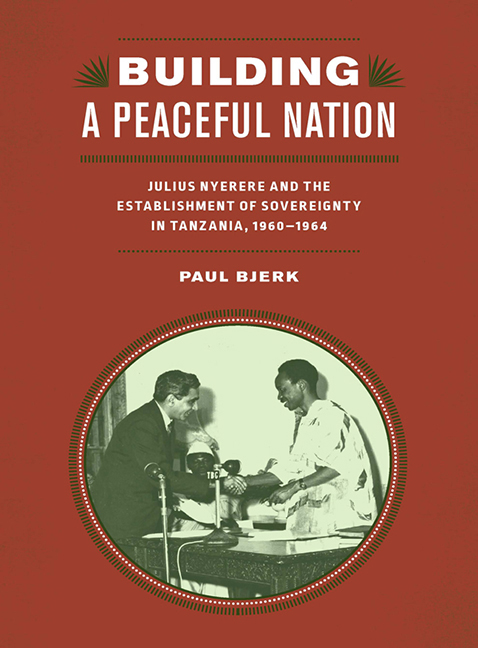 Building a Peaceful Nation
Building a Peaceful Nation 6 - The 1964 Army Mutiny
Published online by Cambridge University Press: 08 May 2021
Summary
The week began with a strike at the state; it ended with a forceful reinstatement of sovereign authority. The final blow came at the hands of a British commando. It was not an invasion, however, but a spectacle of power by a sovereign head of state, exercising authority both within the nation and as a member of the international community. A day-by-day account of the events of the mutiny of the Tanganyika Rifles from January 20 to 27, 1964, brings out the fluid nature of perception amid even more fundamental frameworks of understanding—the passage of time and the anxiety that inheres in the knowledge that the clock is ticking. Sovereignty inhered in the thinking and response of Nyerere and his main advisers during the crisis. This episode makes the slippery nature of state authority, and the discursive strategies of maintaining it, visible in the midst of turmoil. The issue at hand, racial policy, struck at the very identity of the state and at one of Nyerere's most closely held moral virtues. The mutiny was initially little more than a labor strike to protest the continued presence of British offi- cers in the army. But the turning point that led to the invitation of British intervention was the Tanganyikan discovery of evidence of a plot to assassinate top politicians and overthrow Nyerere's government. As a military rebellion and an attack on Nyerere's national ethic, the mutiny directly threatened the race-blind state he had built.
In a study of the three cascading army mutinies in Tanganyika, Uganda, and Kenya that week, Timothy Parsons suggested that “Nyerere was eventually forced to accept the British offer after radical leaders of the Tanganyika Federation of Labour and renegade TANU politicians made contact with the striking askaris [soldiers].” Such a turn of events could have blown up the mutiny into a full-fledged coup d’état that could have fundamentally changed the course of national politics. Parsons acknowledged as much: “With the soldiers behind them, the rogue trade unionists would have the resources to topple Nyerere's government.” Yet, lacking further evidence, Parsons largely ignored the implications of a labor-led coup plot.
- Type
- Chapter
- Information
- Building a Peaceful NationJulius Nyerere and the Establishment of Sovereignty in Tanzania, 1960–1964, pp. 131 - 154Publisher: Boydell & BrewerPrint publication year: 2015
- 1
- Cited by


